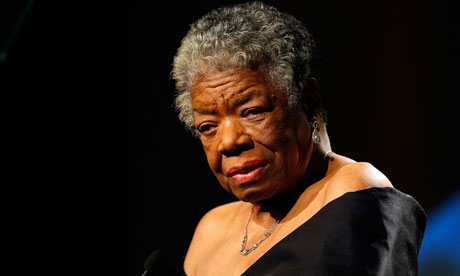There has always been something bittersweet about the life experience of Maya Angelou. Think of the literature fashioned from a harsh and tragic upbringing in racially segregated Missouri and Arkansas: I Know Why the Caged Bird Sings; Wouldn't Take Nothing for my Journey Now. Think of her triumphs articulating the struggle of African Americans through the civil rights era. Consider that each year, her birthday, 4 April, brings with it both joy and painful memories. Who would share that anniversary with the assassination of her friend, Martin Luther King?
This year, if it progresses as Angelou expects, will exacerbate the pattern, bringing a momentous high, but not before some sickening lows. Don't worry about Barack Obama, says the chronicler of black history. He'll be re-elected. He deserves to be re-elected. But between now and November, it's going to get nasty.
"I think we are going to see a number of people who say: 'I have no racial prejudice in my heart, not in my conversation,'" Angelou says. "But in the next few months, as we wind up to the double campaign, I tell you we are going to see some nastiness, some vulgarity, I think. They'll pull the sheets off."
Obama has critics and doubters. Angelou, the sage of black America, now 83, has no time for them. "I think he has done a remarkable job, knowing how much he has been opposed," she says. "Every suggestion he makes, the Republicans en masse fight against him or don't vote at all." It's about him being a Democrat and being the first black president, she says.
Angelou worked with King in the 1960s as northern co-ordinator for the Southern Christian Leadership Conference and the pair debated the possibility of a black president. King said it would happen within 40 years. Angelou told him it would not happen in her lifetime. She was wrong; happily so.
Reflecting on that presidency, what did she expect? "I was hoping for the best. And I think I have gotten the best from him." What of his detractors? "Those are people who didn't see the morass into which he stepped."
He is America's president. But he also describes himself as America's first black president. That, says Angelou, speaking from her home in North Carolina, has had an extraordinary impact on black America. "His physical self, just being there, his photograph in the newspapers as president of the United States; that has done so much good for the spirit of the African American. We see more and more children wanting to be like President Obama, wanting to go to school."
Angelou, still active despite chronic obstructive pulmonary disease(COPD), has been keen to fete Obama, and he has been equally keen to return the favour. In 2010, she was named at the White House as one of 15 recipients of the Presidential Medal of Freedom, America's highest civilian honour. Obama quoted her, saying: "History, despite its wrenching pain, cannot be unlived, but if faced with courage, need not be lived again."
More recently, her presidential link has been via the first lady, Michelle Obama. "She's the grand dame," says Angelou. "I wrote her a note a few months ago because I was in a gathering. The president and his party were there, but I had to leave early. I know that's a gaffe because no one leaves the building before the president so I wrote and apologised. I got a letter from her in her own handwriting. She said: 'I have only one regret – that I didn't come over and hug your neck.'"
When next they met, Angelou's shock was palpable. Millions of viewers of the US channel Black Entertainment Television (BET) saw the author – recipient of three Grammys, a Pulitzer nomination and 30 honorary degrees – prepare to receive more yet recognition; a BET Honors award. She had no idea who would present it. Enter the first lady. "She talked for about 10 minutes about my work and its impact on her and her husband for the past 20 years," she says. "Calm now, but not then, Angelou told reporters: "I thought my heart would burst."
The icons of black America are prized. Soldiers of the civil rights movement especially retain an ability to speak to white and black Americans with some chance of a hearing, Angelou in particular. She has the Obama connection, but she also had a Clinton connection. She composed a poem, On the Pulse of Morning, and read it at Bill Clinton's 1993 inauguration.
The landscape is different here in all sorts of ways. Angelou has visited the UK on many occasions, but she doesn't pretend to understand the intricacies of its society. Asked to compare the two, she offers a view that black people in Britain don't "have the same spirit African Americans have for a number of reasons. One is the population. Our impact on society is another."
But in the US, when she speaks, she is revered. Recently she has been, pleading, admonishing and cajoling on a range of topics. Last month, the National Park Service was forced to remove an inscription from theMartin Luther King memorial in Washington because the quote it displayed was truncated. King said: "Yes, if you want to say that I was a drum major, say that I was a drum major for justice. Say that I was a drum major for peace. I was a drum major for righteousness. And all of the other shallow things will not matter." The inscription said: "I was a drum major for justice, peace and righteousness." That makes him seem like an "arrogant twit," complained Angelou. Against the wishes of the architect, the inscription will be changed.
She has also voiced thoughts on black history month, celebrated in the US in February. There, as here, some question the need for a yearly concentration on black history. Would it were unnecessary, she says.
"Won't it be wonderful when black history and native American history and Jewish history and all of US history is taught from one book. Just US history. I am trying to work myself out of a job by being so active extolling the virtues of African Americans."
Some said Obama's America would be post racial. "That was silly," she says. "That was the same thing that happened in the 60s, alas, and it set us up for some really terrible years. In the 50s and 60s, when integration was legally voted in, a number of black people stopped telling their children what they had been told, and all black children had been told in the US: that it all depends on you; you must get to school and you must go for As. After 1960 and for 10, maybe 20 years, the young people were let go. 'Go and have your own ideas and be eccentric. You don't have to go to school. Learn to dribble a ball.' It was pitiful. Grades that were fine in black schools sank to an embarrassing level." The malaise has since been addressed, she says. "People have awakened to the mistakes."
Another issue created yet more headlines. The rapper Commonobtained Angelou's permission to use her voice on the opening track of his current album, The Dreamer/The Believer. She was mortified that elsewhere he uses the N-word and the B-word in reference to women. Last month, again on BET, they appeared together in a special called Soulmates. The pair have cordially agreed to disagree.
"It is terrible," she says. "Europeans, or whites, used the N-word; and it is as if the black people say: 'You hate me and show you hate me by using that word. Well, let me show you how to hate me. I can use that word. I can hate myself more than you can hate me.' It's a most vulgar and senseless attitude. My prayer is that young men and women who use that word will rethink."
Angelou wears many labels. With the books and screenplays, her film work and stints in Egypt and Ghana – where she first worked withMalcolm X – she has been called a "global renaissance woman". But she calls herself a working mother and an optimist. And not just for the president. That is despite the racism and the inequalities. The beauty of 83 years and a clear eye is an ability to see the big picture. "I see how far we have come," she says. "We live very short lives. Even at 100 we live short lives. We hardly see the magnitude of our progress. A little over 150 years ago, all blacks in the US were either slaves or escapees and people were legally lynched in the city centre."
And now one of them is the president. In November, perhaps, he will get a second term.

